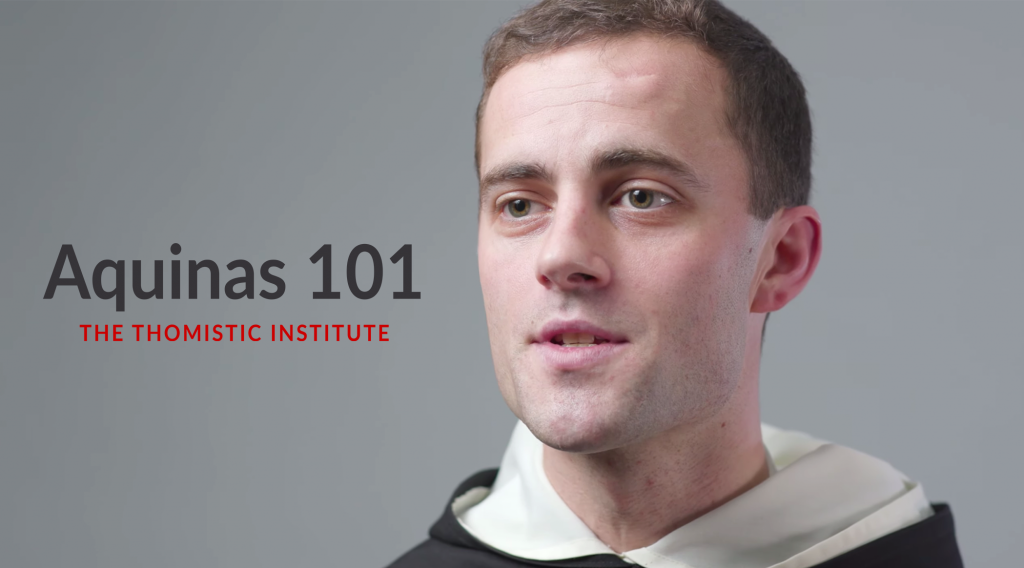Interview: Aquinas 101 – The Thomistic Institute

Aquinas 101 from The Thomistic Institute
Aquinas 101 has generated a lot of buzz since its recent launch this summer. Over 12,000 people have signed up for the series of free courses. Fr. Gregory Pine was kind enough to talk with us (via email) about some of our favorite topics: St. Thomas Aquinas, his work, and the new project from the Thomistic Institute.
Fr. Gregory Pine will be in Oklahoma next month and we will have the opportunity to sit down with him to record an episode of The Catholic Man Show. If you have a question you would like us to ask him in the interview, you can submit your question on Patreon.
Who is St. Thomas Aquinas and why is he called the Common Doctor?
When many folks hear the name, they imagine he was some kind of disembodied mind–impersonal and unapproachable. Think again. Let’s just go ahead and say from the get-go that St. Thomas Aquinas is utterly delightful.
St. Thomas was a Dominican friar who lived in the thirteenth century. His life was shaped by contemplative prayer and study, and he dedicated himself generously to the service of the Church and the world. He wrote theology textbooks, commentaries on philosophical texts, commentaries on Scripture, popular sermons, and all kinds of other works.
More than mere brain, St. Thomas Aquinas was an inspiring saint, philosopher, theologian, preacher, and poet. Throughout the course of his life, the Lord blessed him with many graces, foremost of which was the grace of wisdom. St. Thomas had a lively faith and a keen intellect, and he was able to plumb the depths of revelation and present the mysteries of the faith in coherent and compelling fashion.
It has been said of St. Thomas that he seemed to have inherited the intellect of all. Perhaps better than anyone before or since, he harmonized the riches of the Christian tradition with the learning of antiquity, and he assists his students in doing the same. And, it’s for this reason that he is often called the “Common Doctor.”
Many don’t know that he is also wrote poetry and biblical commentary. Do you have a favorite recommendation?
St. Thomas wrote all kinds of insightful and beautiful things. He wrote commentaries on the Gospels of Matthew and John, a compilation of comments from the Fathers on all four Gospels, commentaries on all of St. Paul’s letters, and commentaries on quite a few Old Testament works as well. In addition, we was tasked with writing the liturgy for the Solemnity of Corpus Christi. Some of the most exalted Eucharist hymns (like the O Salutaris and the Tantum Ergo) flowed from his pen.
I especially love his Commentary on the Gospel of John. While the style takes some getting used to, it’s an incredible combination of devotional and theological gems, because for St. Thomas, the two aren’t to be considered apart. Prayer and study, for St. Thomas, are two dimension of the same contemplative gaze upon God. Faith and charity are the fonts of theology and mysticism alike, and by contemplating God and the things of God–whether at the desk or in the chapel–we are given more fuel for the fire of charity to burn with greater and greater intensity.
Why do many Catholics think St. Thomas Aquinas is intimidating to read and study?
If you’ve ever tried to read St. Thomas, it doesn’t always come easily. St. Thomas uses a vocabulary that can be technical and difficult. He writes in a style that doesn’t always jive with our modern sensibilities. And, the genre of his works is a far cry from what we’re accustomed to read. This isn’t to say that he is inaccessible, but it is to say that we need to do some work to recover his insights for the present day and age.
That being said, St. Thomas isn’t reserved only for an elite class of bookworms. His philosophy is billed as the perennial philosophy since it corresponds to common sense and has a way of recurring throughout the ages. To get into St. Thomas, it takes a bit of effort at the outset, but once you’ve begun, what you discover is a wise friend willing to accompany you through the whole of the faith. St. Thomas has a knack for explaining thorny and vexing theological issues with clear principles that help you appreciate just what is at stake and how best to cling to the truth.
Have you seen an increase of interest in St. Thomas Aquinas’s work over the last few years and who came up with the idea to start Aquinas 101?
St. Thomas died in 1274, and since then his thought has had a mixed reception throughout the centuries. In some ages, interest wanes, and in other ages, interest waxes. Now, does that necessarily mean that it’s true? Couldn’t we say similar things about fads like bell-bottoms and side-ponytails? What then is distinct about Thomism?
I think what separates the thought of St. Thomas from a mere fad is that it is not just a matter of preference, it’s a matter of truth. St. Thomas seems to do the best job in the history of the Church of presenting the faith in its entirety. St. Thomas is simply the best teacher when it comes to God and the things of God. His mastery of philosophical and theological learning, his careful attention to pedagogy, his mystical insights all equipped him for the task of teaching the faith entire, and he did it to near perfection.
Now, are there other traditions in the Church’s history which offer deep and probing insights into the nature of God and the Church? Undoubtedly. Did the Church do just fine for twelve centuries before St. Thomas came along? Yes, it did. Would we still be able to get along were St. Thomas never to have set pen to paper? Probably.
So, why then the insistence on St. Thomas? Well, because it seems that in his providence, the Lord has given us St. Thomas as the best of teachers. St. Thomas illumines his students not only about God and all things in light of God, but also about how to conduct this inquiry and how to cultivate habits of mind and heart that sanctify us unto eternity. There’s just nothing quite like it on offer, and the Church has consistently proposed his thought as a safe and sure help in the pursuit of wisdom.
What should I expect when signing up for Aquinas 101? Are there any pre-qualifications to sign up?
Aquinas 101 is a series of short videos (3-10 minutes long) that walk you through the thought of St. Thomas Aquinas. By the time we’ve rolled out all the content, there will be 85-90 videos in total. Each video comes with course listening (a podcast selected for the theme) and course readings (taken from St. Thomas himself and from some of his expositors). Lessons also come with Further Resources for the curious and the option to “Ask a Friar” for any remaining questions.
By taking the course, you’ll gain mastery of the essentials of St. Thomas’s philosophy and theology, and you’ll be able to read him on his own terms. The videos walk you through 1) Who is St. Thomas and why is he important? 2) An introduction to his philosophy and 3) A study of the main themes of the Summa Theologiae–his masterwork.
If you enroll in the course, we’ll send you two lessons each week (every Tuesday and Thursday). We’ve found that to be a good pace to proceed, giving you time to develop the philosophical and theological tools to get the hang of it.
St. Thomas’s sister is said to have asked him how to become a saint. He responded, “Desire it.” The same goes for taking Aquinas 101. There are no pre-qualifications to sign up; you just have to want it.
How can people sign up for Aquinas 101 and how can people support the Thomistic Institute?
To sign up for Aquinas 101, just go to Aquinas101.com and enroll. We’ll get you started within the week, and you’ll be well into it before you know. To learn about other programs offered by the Thomistic Institute, go to thomisticinstitute.org. Each year, we host on campus events at universities through the US, Canada, England, and Ireland as well as a variety of retreats, colloquia, and conferences for undergraduate and graduate students. We’d be delighted to get to know you and to see you at our events.
Make sure to check out the Dominican friars new podcast, Godsplaining.
Join the Dominican friars every week as they muse on all things Catholic. Considering topics philosophical, theological, cultural, and beyond, Godsplaining presents ideas from the Church’s tradition and brings them to bear on our lives’ most urgent questions.
You can also listen to Fr. Gregory Pine on Matt Fradd’s podcast, Pints with Aquinas.

